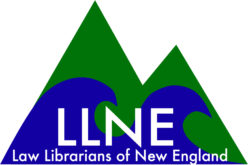Because there are so many folks from LLNE here in the city of heat and humidity – er, I mean brotherly love, I’ve been asking folks to send me snippets of things they’ve learned at various programs, from posters, & from interactions with library folk from around the country. Over the next few days, I’m hoping to post short snippets of what they say here.
One of the first things I went to here in Philly was a RIPS roundtable on distance learning. We’re in the process of putting together an asynchronous research class, and so I took this opportunity to learn from folks who have been doing it. The overall take-aways were: there are as many different ways of doing this as there are people doing it, on platforms from TWEN to Canvass, some using interactive discussion boards, some relying more on video presentation & written work. What is very clear is that the folks who are doing this all benefit from a sharing of resources and best practices – and to that end, we began a collection of names and email addresses of folks interested in sharing resources and best practices.
A few of the things we talked about:
- In terms of assessment, consensus was that students should be asked on a weekly basis to do short research assignments, & produce written trails that require students to demonstrate the ability to use the resources they’ve learned about, rather than just regurgitate what was in the reading or on the video.
- Students may expect quicker turnaround of assignments for online classes. Their impatience may be forestalled by giving general feedback to the class as a whole (i.e. “What I’m seeing in these assignments…”) before actually returning the assignments.
- People had various ideas for inspiring interactive discussion, i.e. getting students to use online discussion boards. Some suggested that a short video presentation – either the beginning of an instructor-student discussion of a topic, or even a short “client interview” type skit – has worked to spur active discussion.
- Some folks are using the interactive discussion boards as a way of “taking attendance” – making sure that the class comports with the ABA Standard 316, which governs distance learning.
- As always: humor works – & is a great tool to engage students, even asynchronously.
There was a great deal of enthusiasm in the room – at the table – because it seems clear that asynchronous/distance classes are a large part of the future of legal education. Sharing resources & best practices will become more essential as we all work to figure out how to do this most efficiently.
